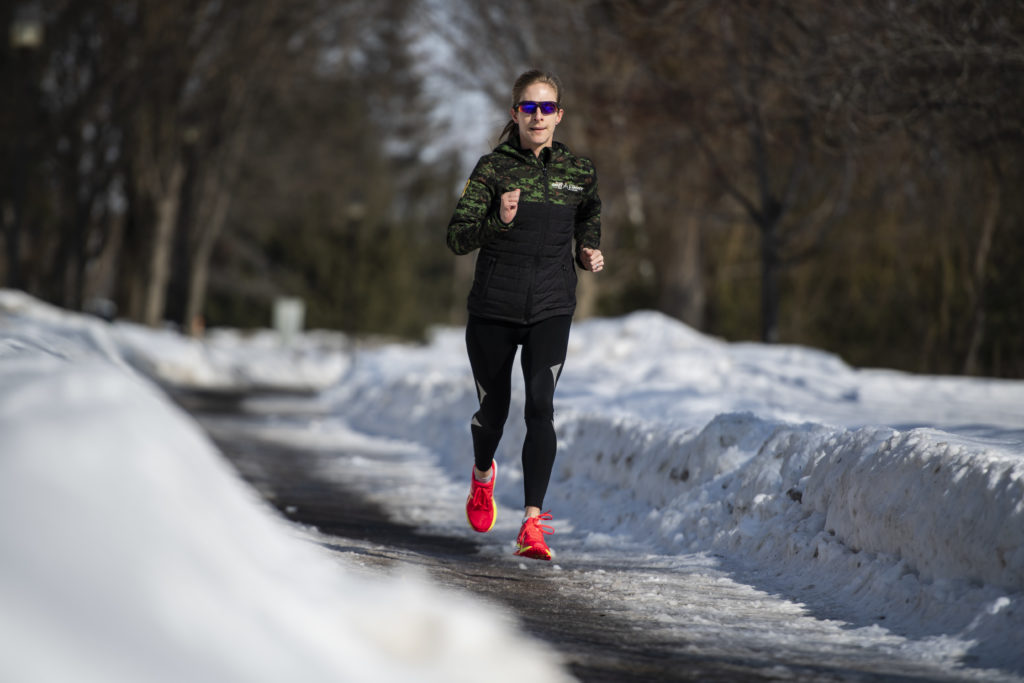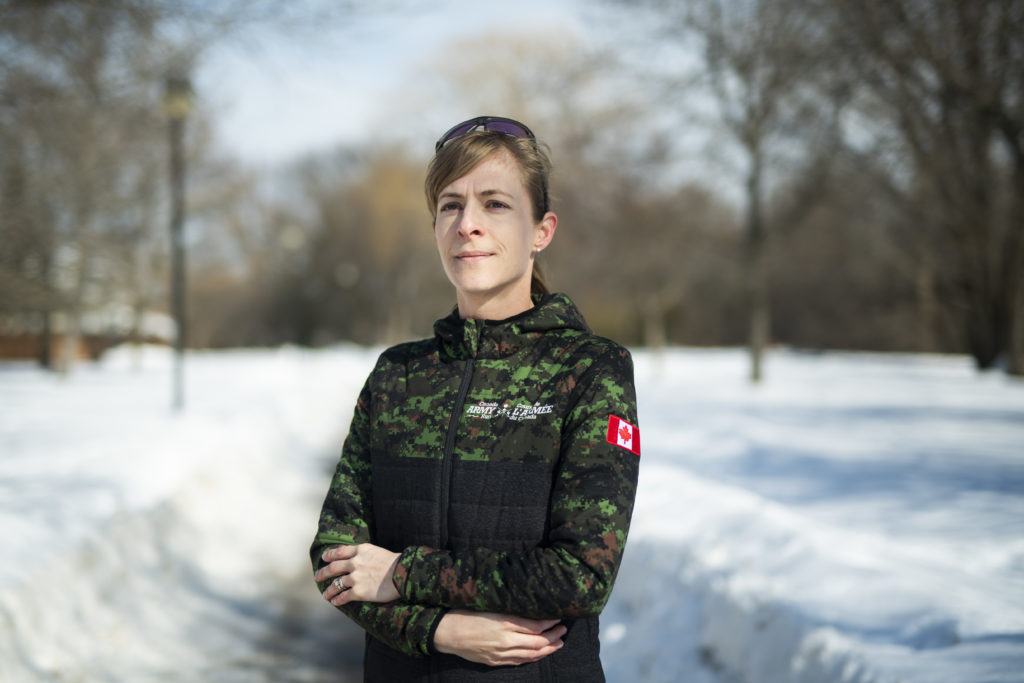An accomplished military major and triathlete, Maj Lesley Quinlan takes on her most challenging operation to date as the Canada Army Run’s newest race director.
“No Ordinary Race.” That’s the slogan for the Canada Army Run. Fittingly, Lesley Quinlan, the event’s newly-minted race director, is no ordinary woman.
Quinlan, a 41-year-old major in the Canadian Armed Forces, has had an accomplished athletic career in the military, including 2018 when she was named as the Military Personnel Command Female Athlete of the Year. Quinlan’s success continued in 2019, with individual silver and mixed team gold at the CISM World Military Games in triathlon in China, and two golds back home: one in the 10K at the CAF National Triathlon Championship (Gatineau, Quebec) and another in the 10K at the CAF National Running Championship (held at Ottawa Race Weekend in May).

It wasn’t a surprise, though, that Quinlan, naturally self-effacing and in the military, where tooting your own horn isn’t exactly encouraged, gives credit for her accomplishments to those who have supported her along the way, including her husband, Chris, her teammates and her eight-year-old daughter, Katherine. “She tells everybody I’m the new race director, including her grade three teacher, who runs as well. I thought that was pretty cute,” Quinlan says.
Yet one of the biggest challenges in Quinlan’s military career may lurk in September from the sidelines in her new role as Race Director for the Canada Army Run. One of Canada’s most popular running events, the race commences with the firing of a cannon and ends with each participant receiving dog tags upon crossing the finish line. Races on offer include 5K, 10K and half marathon distances, as well as the “Victory Challenge,” where participants compete in both the 5K and 10K races. There’s also the Commander’s Challenge, which sees runners race the 5K and half marathon.
No surprise, given the military runs the event, the Canada Army Run has a reputation as one of the most well organized road races in the nation—one that Quinlan’s tasked with upholding. Beyond Quinlan’s bon mots as an accomplished distance athlete who’s witnessed her fair share of both highly organized race events and near disasters, Quinlan says that it’s her experience in expecting the unexpected that makes her equipped to take the helm at this year’s Army Run.
“I’m sort of a bag of left-field experiences,” Quinlan says. Starting as an air cadet as a teenager, she later joined the Canadian Instructors Cadre (CIC), which oversees the safety, supervision, administration and training for the navy, army and air cadets. Quinlan’s now an Army Officer in the Primary Reserve Force, which consists of CAF members from across the country, ready to conduct military operations domestically and internationally.
As a youth, Quinlan swam competitively into her teenage years while also running some cross country and track, but she preferred running in the woods over paved surfaces. Her athletic journey in the forces began when she started competing in Military Pentathlon, which includes shooting, obstacle running, obstacle swimming, throwing and orienteering. “I had no idea what I was getting myself into,” Quinlan freely admits. “It’s very demanding training in the summer, more challenging than anything I’d done to date, but it set me down the path to more serious training and eventually triathlons.”
In the summer of 2003, Quinlan dipped her toes in triathlon, riding a rented bike for the cycling portion of the race. Quinlan enjoyed it enough to buy a road bike and competed in her first Olympic-distance race (1.5K swim, 40K bike, 10K run) in Wasa Lake, British Columbia in 2006, where she learned “a number of lessons,” namely, wear a wetsuit if you don’t want to find yourself quickly at the back of the pack and freezing to death high in the mountains in a glacier-fed lake. “I was standing on the beach with all the other participants, it was a mass start, and I think one other person and myself were ‘sans wetsuits,’ and that was a pretty big clue,” Quinlan says.
However, Quinlan found cumulative success in races thereafter and started to shine as a triathlete, ultimately competing with the CISM team (i.e. the International Military Sports Council) since 2012. Quinlan says her competitive nature and sense of duty played a big part in her rise as a triathlete. “I’m a bit of a competitive person by nature,” Quinlan says. “On the CISM team, I look at it very much like I have a job to do, both as an individual competitor and CISM team member.”
Quinlan’s natural athleticism and drive to compete has led to a whole new level of success in triathlons of late, capturing silver amongst women in the masters’ category at the CISM World Games in Wuhan, China last year, and contributing to gold overall for Team Canada. She also credits her military background in executing often complex tasks under duress as playing a key role in her rise as a triathlete. Quinlan also spent several years taking 911 calls for the police, which hardened her ability to shut down and focus on executing tasks to save lives. However, Quinlan again credits her military experience as a quick lesson in learning the value of teamwork in stressful, shifting environments. “You don’t do things alone or in a silo,” she says. “It’s about being part of the team and leaning on everybody around you as well.”
Quinlan’s coach, Sharon Donnelly, competed at the first ever Olympic triathlon at the 2000 Summer Olympics in Sydney, Australia, and also worked with the US National Triathlon Team. Donnelly witnessed first-hand how Quinlan would take on multiple stressful challenges during her journey as a triathlete, yet still would rise to the occasion. “No matter if she was able to get the preparation she needed or not, Lesley performed,” Donnelly recalls. “From my perspective as a coach, she’ll take on this new role as race director the same way she takes on her training and race preparation—no stone unturned, flexible and keeping it fun.”
Experience, aptitude and success as a highly trained officer in the military and a talented triathlete all played a significant role in motivating Quinlan to apply for and ultimately become the Canada Army Run’s race director. Yet there’s another key factor for why Quinlan landed the race director role, and maybe the most underrated: she’s a people person. “I am very interested to hear what participants want out of the race, but hope they also understand I’m not always the final authority as there are many players involved,” Quinlan says. “I’m passionate about doing everything that we can here to put on the very best event possible.”
Quinlan also feels honoured as the first ever female race director for the Canada Army Run. That said, it’s not a particularly political issue for her. “I have no soapbox on the subject. The focus is simply on selecting the best person for the job,” she says. “If anything, it’s a good indicator that gender is no longer a barrier to women and positions they can hold.”
Friends and teammates all tell Quinlan that she’s perfect for the Canada Army Run race director role, which she appreciates. However, Quinlan says she’s internally motivated and confident about her new role because she feels she understands what participants want: a fun, well organized race. Quinlan’s also competed in enough events to know where the pitfalls lie, including registration hiccups to corralling participants to the start line and ensuring a smooth baggage collection at the end of the race. Quinlan believes it all comes down to making sure the Canada Army Run is a success again in 2020. “The difference between a good and bad race experience is apparent from an athlete’s perspective,” she says.

And it’s not just her friends and family that admire Quinlan and trust she’ll a make a great race director, so do those all the way up the chain of command, including Lieutenant-General Wayne Eyre, Commander of the Canadian Army, who notes how important the race is in terms of funds for important causes. “Few events have done as much good for as many people as the Canada Army Run. Since 2008, it has generated nearly $4 million for Support Our Troops and Soldier On to support ill and injured soldiers and their families,” Commander Eyre says. “Just as importantly… no one knows this better than our new race director, Major Lesley Quinlan—a soldier, triathlete, mother and now our first female director.”
Major-General Derek Macaulay, Deputy Commander Canadian Army, adds: “Canada Army Run is no ordinary race, just like our new race director. Major Lesley Quinlan, an accomplished Canadian Forces Officer and international triathlete, knows the preparation, attention to detail and effort it takes to successfully get across the finish line. She is the ideal leader to ensure we continue to make Canada Army Run one of the best in Canada.”
As part of Quinlan and her staff moving forward for this year’s race, they know that they have to look at the mistakes in past editions of the race to figure out what could go wrong, including last year’s bottleneck of runners in the 5K and hiccups in participant baggage pickup. Quinlan says she and her team have several measures in place to make sure there are no repeats of those situations. Specifically, the National Capital Commission, charged in part with developing and improving Canada’s Capital Region, has offered a piece of land for a dedicated baggage tent. Quinlan says they’re going to change the corral set up as well, giving racers more time and better spacing at the start, along with fewer constructions at the finish line.
“Along with moving the finished food area a little bit farther up the road in front of the War Museum, these changes are all going to contribute to improving the biggest issues for the 2020 race,” she says.
Finally, Quinlan doesn’t have either a particularly feminist or conservative viewpoint about her new role, as she wouldn’t with any position within the Canadian Military. She does believe, though, that the Canadian Armed Forces should be gender-neutral. While Major Quinlan says she’s proud of her accomplishments and historic appointment, she remains modest to the end. “I’m sure that I’m just the first of many women and other men to hold this post down the road. Competence, dedication and professionalism should trump gender.”
This article appears in iRun’s first issue of 2020. Read the entire issue here.
Dave Carpenter is a staff writer for iRun, as well as a content strategist, writer and photographer based in Toronto.






 Current Issue
Current Issue Previous Issue
Previous Issue Prior Release
Prior Release

Best wishes for your new appointment Maj Quinlan